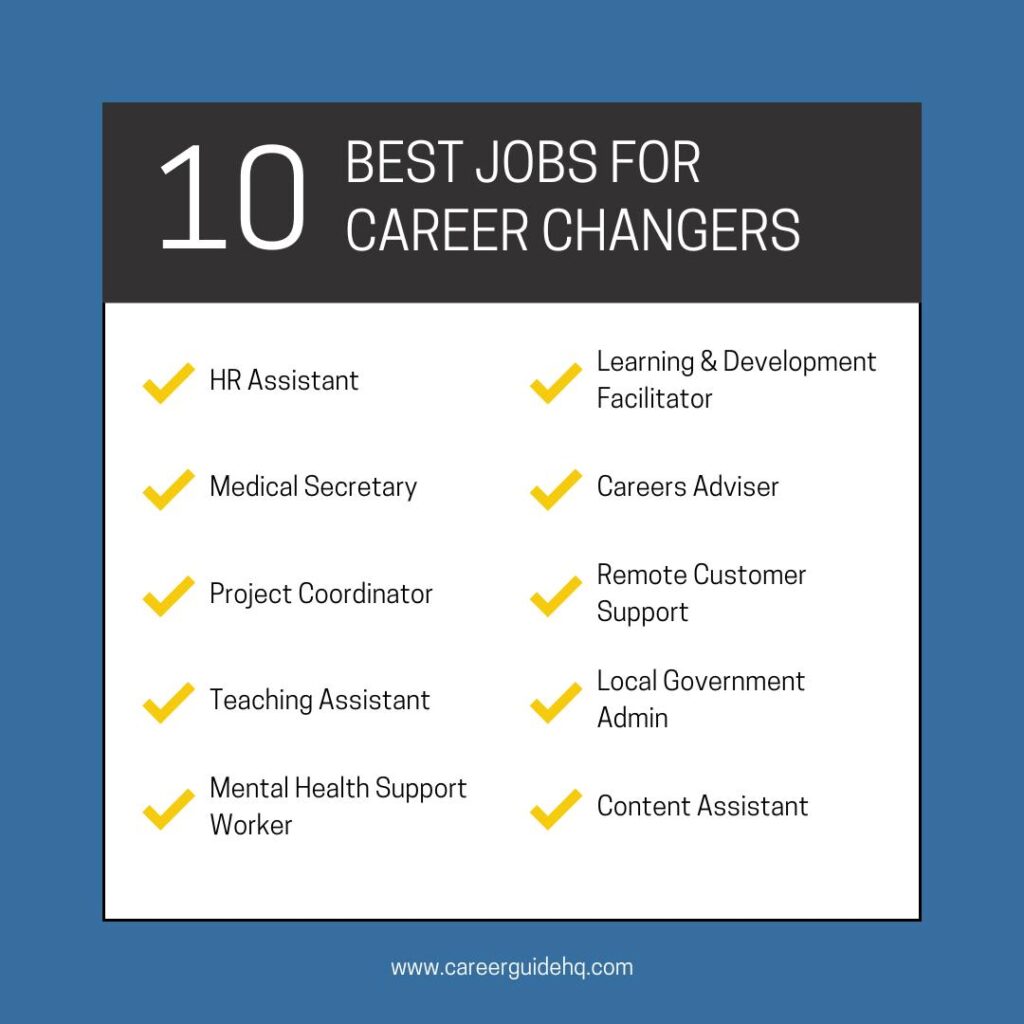Written By Jessie Smith – a Career Development Specialist with 10+ years in recruitment with a passion for helping professionals find flexible, fulfilling careers that truly fit.

Thinking of a career change at 40—but worried you’re too old, too late, or underqualified?
You’re not.
In fact, your 40s might be the best time to start over.
In this guide, you’ll find 10 realistic jobs you can start with no degree, no burnout, and no starting from scratch. These roles are flexible, in-demand, and tailored for people just like you: smart, experienced, and ready for something more fulfilling.
Let’s explore what’s next—without the overwhelm.
- Summary: Best Career Change Jobs at 40
- Is 40 Too Old to Change Careers? Why Midlife Is the Perfect Time
- How to Choose the Right Career Change at 40 (Step-by-Step Guide)
- 10 Best Jobs for a Career Change at 40
- Career Change at 40 FAQs (No Experience or Degree? Start Here)
- Career Change at 40: What to Do Next (3-Step Action Plan)
Summary: Best Career Change Jobs at 40
Here are 10 great career change options for people in their 40s—chosen for flexibility, future growth, and minimal retraining:
- HR Assistant – Great for people-focused communicators
- Medical Secretary – Stable admin role in healthcare
- Project Coordinator – Perfect for natural organisers
- Teaching Assistant – Rewarding work with children
- Mental Health Support Worker – Empathetic, meaningful work
- Learning & Development Facilitator – Help others grow professionally
- Careers Adviser – Support jobseekers with your experience
- Remote Customer Support – Flexible, entry-level and remote
- Local Government Admin – Secure, values-based public roles
- Content Assistant / Social Media Exec – Creative work, no degree needed
Scroll down for who each role is best for, what skills you’ll need, and how to get started—even with no formal experience.
Is 40 Too Old to Change Careers? Why Midlife Is the Perfect Time
Changing careers in your 40s might feel daunting—but it’s actually more common than you think. Research shows the average age for a career changer is between 39 and 41, with many people making their most meaningful professional moves in midlife.
Why? Because by your 40s, you’ve likely built up:
- A clear sense of what matters to you
- Strong communication, problem-solving, and leadership skills
- The emotional intelligence that employers value more than ever
And the job market is catching up. With longer working lives and more flexible roles—especially in sectors like healthcare, education, remote support, and HR—there are now more opportunities that fit your life, not just your CV.
You’re not behind. You’re experienced, adaptable, and often better equipped than younger candidates to bring value from day one.
How to Choose the Right Career Change at 40 (Step-by-Step Guide)
When you’re having a career change at 40, the goal isn’t to “start over”—it’s to shift into something that fits your life now. That means choosing a role that values your experience, works with your current responsibilities, and still leaves room to grow.
Here are three key things to focus on:
1. Transferable Skills
You likely have more relevant skills than you think. Leadership, time management, communication, conflict resolution—these apply across industries. The trick is knowing how to reframe them for your new direction.
🔗 Need help explaining your skills on paper? Check out our Career Change Cover Letter Guide.
2. Lifestyle Fit
At this stage, flexibility matters. Whether you’re juggling family, caregiving, health, or just want better balance, look for roles that offer part-time options, remote work, or reduced stress—without sacrificing purpose.
3. Future-Proofing
Choose a job that still has room to grow. Sectors like healthcare, education, tech support, and admin services continue to expand, and many roles don’t require a degree—just adaptability and a willingness to learn.
The right midlife career isn’t about climbing the ladder faster. It’s about doing work that finally feels like it fits.
10 Best Jobs for a Career Change at 40
These roles were chosen for their flexibility, growth potential, and compatibility with skills many people already have by their 40s. Most don’t require a degree, and many offer routes into meaningful work without starting at the bottom.
Each option below includes what the job involves, who it’s a good fit for, and how to get started—even if you’re switching from something completely different.

1. HR Assistant or HR Support Officer
Why it’s a great fit: If you’ve spent years working with people—managing teams, resolving issues, handling communication—you already have a strong foundation for HR. This role allows you to support hiring, training, and staff wellbeing, often with room to move into more senior roles over time.
Transferable skills:
- Conflict resolution
- Organisation and record-keeping
- Communication and people management
Good for: Former retail workers, teachers, customer service leads, or anyone with people-focused experience
Getting started: Many entry-level HR roles only require high school diploma/GCSEs or equivalent and can be boosted by short online courses (like CIPD Level 3 or a community college course). You can often start in admin or HR support and work your way up.
2. Medical Secretary or Healthcare Administrator
Why it’s a great fit: The public and private healthcare providers need reliable, organised staff to manage appointments, handle patient records, and support clinical teams. This role lets you work in a stable, meaningful environment—even without clinical training.
Transferable skills:
- Strong admin or clerical experience
- Ability to stay calm and professional under pressure
- Confidentiality and data management
Good for: Ex-receptionists, office managers, school admin staff, or anyone with good typing and communication skills
Getting started: A Certificate in Medical Administration can help, but many employers offer on-the-job training. Some roles start at entry-level and provide progression through internal training.
Extra tip: Healthcare roles often list “desirable” but not required qualifications—so don’t be discouraged if you don’t tick every box.
3. Project Coordinator
Why it’s a great fit: Project coordinators keep tasks, timelines, and team members on track—skills many career changers already use daily. If you’ve ever led a team, organised rotas, or juggled deadlines, this could be a great next step.
Transferable skills:
- Scheduling and organisation
- Communication and stakeholder management
- Problem-solving and multitasking
Good for: People from education, retail management, logistics, or hospitality—especially if you’re used to managing processes or people
Getting started: You can enter project coordination via temp or contract roles. No formal qualifications are required, though a short course in project management (like PRINCE2 Foundation or Agile basics) can open more doors.
Bonus: Remote and hybrid roles are increasingly common in this field, offering flexibility for those with family or health considerations.
4. Teaching Assistant or Paraprofessional
Why it’s a great fit: If you enjoy helping others learn, especially children, this role can be both rewarding and stable. Many classroom assistants in their 40s bring invaluable patience, life experience, and emotional maturity to the classroom.
Transferable skills:
- Communication and guidance
- Behaviour management
- Planning, patience, and empathy
Good for: Parents returning to work, former youth workers, retail supervisors, or those already volunteering in schools
Getting started: Many schools accept basic Teaching and Learning qualifications (online or part-time). You can also gain experience as a volunteer first to boost your CV.
Important note: TAs are in high demand—especially in SEN (Special Educational Needs). This path can lead to roles in pastoral care, learning support, or even teacher training later on.
5. Counsellor or Mental Health Support Worker
Why it’s a great fit: If you’re a strong listener, empathetic, and drawn to meaningful one-on-one work, mental health support could be a natural transition. It’s a growing field that values maturity and lived experience—something many 40-somethings bring in abundance.
Transferable skills:
- Active listening and emotional intelligence
- Conflict resolution or crisis handling
- Experience supporting others (professionally or personally)
Good for:
Former teachers, care workers, parents, or anyone who’s supported people in challenging situations
Getting started: You can begin as a support worker or peer mentor with minimal training, often earning while you train. To become a qualified counsellor, many start part-time with a Certificate in Counselling Skills, followed by a diploma. You can look at your local community college to see what courses they offer there too!
Extra insight: Lived experience of trauma, disability, or mental health challenges is often seen as an asset in this field—especially in community, NHS, or charity roles.
6. Learning & Development Facilitator
Why it’s a great fit: If you enjoy coaching, training, or breaking down complex information into something others can use, this role combines education, communication, and creativity. It’s ideal for those who’ve led teams or mentored others.
Transferable skills:
- Training or onboarding experience
- Presentation or workshop delivery
- People development and feedback
Good for: Ex-teachers, store managers, team leaders, or anyone who’s helped others grow
Getting started: Entry points include internal training roles in organisations, apprenticeships/internships, or adult education support. You can boost your profile with a relevant course through your local community college or if you are in the UK, a Level 3 Award in Education & Training (AET).
Tip: Many companies hire L&D roles internally first—so don’t overlook development opportunities at your current workplace.
7. Careers Adviser or Employment Coach
Why it’s a great fit: This is an ideal role for career changers who want to help other people do the same. You’ll work one-on-one or in groups, helping jobseekers identify paths, prepare applications, and build confidence.
Transferable skills:
- Empathy and non-judgmental communication
- CV writing or interview prep experience
- Coaching, mentoring, or facilitation skills
Good for: Former teachers, HR professionals, jobcentre staff, or anyone who’s supported people through change
Getting started: Many roles are available through local government divisions, employability charities, or training providers. While some require a relevant college or university level degree, others offer training on the job.
Bonus: There’s growing demand for coaches who’ve switched careers themselves—it adds authenticity and relatability for clients.
8. Remote Customer Support or Client Care Specialist
Why it’s a great fit: If you’re looking for flexibility, stability, and minimal retraining, remote customer support can be a smart option. Many companies now offer fully remote roles, making it ideal for people balancing family, health, or location needs.
Transferable skills:
- Clear and friendly communication
- Patience and problem-solving
- Conflict handling and multitasking
Good for: Anyone with experience in retail, hospitality, education, call centres, or public-facing roles
Getting started: No formal qualifications needed—just a reliable internet connection, basic IT skills, and great people skills. Many companies provide their own onboarding and scripts. Some roles offer progression into team lead, training, or quality assurance.
Tip: Remote roles are posted across sites like Indeed and Remote.co. Adding customer service keywords to your CV can make you more discoverable by recruiters.
9. Local Government Admin Roles
Why it’s a great fit: These roles often offer job security, pensions, structured progression, and a sense of public purpose. Many local and national services offer admin, casework, and support roles suited to people with life experience and transferable soft skills.
Transferable skills:
- Organisation and time management
- Written and verbal communication
- Confidentiality and working with sensitive information
Good for: People with experience in schools, customer service, retail management, or care work
Getting started: Entry-level roles often start at a lower pay grade and don’t require a degree. Many offer internships, paid training, or career pathways in HR, finance, or housing.
Bonus: You’re often judged more on values and behaviours than qualifications—especially if you’re good with people and processes.
10. Content Assistant or Social Media Executive (Entry-Level Digital)
Why it’s a great fit: Digital careers aren’t just for 20-somethings. If you enjoy writing, organising, or working behind the scenes, content and social roles offer creative, flexible work that can be done part-time or remotely.
Transferable skills:
- Communication and audience awareness
- Time management and scheduling
- Visual thinking or writing for different formats
Good for: Ex-teachers, marketers, admin professionals, or anyone who’s run a community page, blog, or created training materials
Getting started: Free tools like Canva, Buffer, and ChatGPT can help you build a small portfolio. Courses on FutureLearn or Google Digital Garage are great entry points. Some charities also offer returner programmes for over-40s or career changers.
Pro tip: You don’t need to be an influencer—many companies hire content assistants for internal comms, product descriptions, or scheduling.
Comparison Table: Best Midlife Career Change Jobs at a Glance
| Job Title | Average Salary (UK) | Training Needed | Growth Potential | Lifestyle Fit |
|---|---|---|---|---|
| HR Assistant | £23,000 – £28,000 | Short course (CIPD Level 3) | High (HR Advisor, Manager) | Office or hybrid, 9–5 |
| Medical Secretary | £21,000 – £26,000 | Certificate in Medical Admin | Moderate | Office, sometimes part-time |
| Project Coordinator | £26,000 – £32,000 | Basic PM course (PRINCE2) | High (Project Manager roles) | Hybrid/flexible hours |
| Teaching Assistant | £18,000 – £22,000 | Teaching Assistant Level 2/3 | Moderate (SEN support, teacher training) | Term-time, part-time often |
| Mental Health Support Worker | £20,000 – £26,000 | Certificate in Counselling Skills | High (Counsellor, Therapist) | Shift-based or flexible |
| Learning & Development Facilitator | £28,000 – £35,000 | Level 3 AET or internal L&D training | High (Senior L&D, OD roles) | Corporate or freelance |
| Careers Adviser | £24,000 – £30,000 | NVQ or employer training | Moderate to High | Local government or charity hours |
| Remote Customer Support | £20,000 – £25,000 | Minimal – employer onboarding | Moderate (QA, Team Lead) | Remote, flexible shifts |
| Local Gov Admin | £22,000 – £27,000 | On-the-job or basic admin course | Moderate (specialist admin or policy roles) | Office or hybrid |
| Content Assistant | £22,000 – £30,000 | Free online courses + portfolio | High (Content Manager, Marketing) | Remote or hybrid, creative hour |
Career Change at 40 FAQs (No Experience or Degree? Start Here)
Changing direction in midlife comes with questions—and that’s completely normal. Below are some of the most common concerns people have when making a career change in their 40s, along with clear, honest answers.
Can I change careers at 40 with no degree?
Yes, you absolutely can. Many in-demand jobs—like project coordinator, HR assistant, or remote customer support—don’t require a degree. What matters most are your transferable skills, such as communication, organisation, and leadership.
What are the best jobs for a 40-year-old woman changing careers?
The best jobs for a 40-year-old woman changing careers are flexible, stable, and aligned with your current lifestyle. Top options include teaching assistant, counsellor, healthcare administrator, careers adviser, and social media executive.
Is 40 too old to start a new career?
Not at all. In fact, many people make their most successful career changes in their 40s. Employers value experience, emotional intelligence, and adaptability—traits often stronger in midlife professionals than in younger candidates.
How do I retrain for a new job at 40?
Start by identifying your transferable skills and choosing a career path that fits your goals. Then explore short courses, online certifications, or apprenticeships to boost your knowledge. Many training options are flexible and designed for adult learners.
What careers can I start at 40 with no experience?
You can start careers like admin support, HR assistant, remote customer service, teaching assistant, or digital content roles with little to no experience. These jobs often offer on-the-job training or entry-level opportunities that let you build as you go.
Career Change at 40: What to Do Next (3-Step Action Plan)
If you’re ready to make a move but aren’t sure where to begin, these three steps will help you turn that “what if” into a clear, concrete plan. You don’t need to quit your job tomorrow—but taking action now sets the stage for real change in the months ahead.
1. Identify Your Transferable Skills (with Evidence)
Start by making a list of the skills you’ve built across your career so far. Focus on things that apply across industries, like:
- Managing people or training new staff
- Dealing with difficult customers or conflict
- Working to deadlines, managing stock or rotas
- Writing reports, organising events, or using systems
Then match those skills to real examples. For example:
“Managed a 6-person team through a holiday season with 25% fewer staff—kept rotas running smoothly and complaints low.”
Tool tip: Use job descriptions from your target role to reverse-engineer the skills you’ll need. Then write bullet points on your CV that prove you’ve used those same abilities—even if it was in a different setting.
2. Pick a Job Path That’s Aligned with Your Current Life
At this stage, choosing a career that works with your real life is more important than chasing an idealised dream. Think about:
- Your energy levels: Do you want to work full-time, part-time, or remotely?
- Your responsibilities: Do you need flexible hours or term-time work?
- Your values: What kind of work would feel meaningful at this stage?
Then ask yourself:
“Can I grow in this job without burning out or starting from zero?”
Focus on entry-friendly roles that offer stability and upward movement. Refer back to the 10 jobs in this post—each one was chosen for midlife compatibility.
Mini challenge: Shortlist 3 job titles you’d be happy to explore further. Bookmark a few live job listings—even if you’re not applying yet—and study what employers are asking for.
3. Craft a Skills-Based CV and Career Change Cover Letter
A traditional chronological CV might undersell you if you’re switching industries. Instead, create a skills-first CV that opens with a short profile and 4–6 core skills—each with examples underneath.
For your cover letter, explain your career change in one confident sentence, like:
“I’m now looking to move into healthcare administration, where I can apply 15 years of team coordination, scheduling, and client support experience in a role that aligns more closely with my long-term goals.”
Free resource: 🔗 Use our Career Change Cover Letter Guide for templates, examples, and copy-paste language you can customise.
Bonus tip: Don’t wait until your CV is “perfect.” The act of writing it helps you clarify your direction, and you can refine it as you go.



